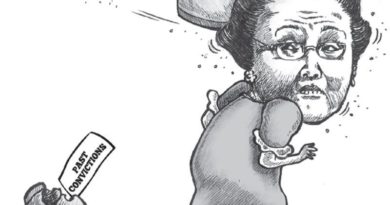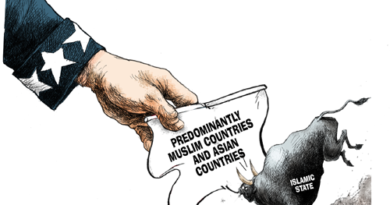COLUMN: FIRST THINGS FIRST– We did it in Mindanao, can we do the next one? – By Francisco S. Tatad
FIRST THINGS FIRST

ON Jan. 21, 2019, close to two million Filipinos ratified the Organic Law creating the Bangsamoro Automous Region in Muslim Mindanao (BARMM), thereby ending more than 40 years of struggle for regional autonomy, waged through six Philippine presidencies, first by the Moro National Liberation Front (MNLF) under Chairman Nur Misuari, and finally by the Moro Islamic Liberation Front (MILF) under Chairman Hashim Salamat, succeeded by Murad Ebrahim.
BARMM formally replaces the Autonomous Region in Muslim Mindanao (ARMM) created in 1989 under the 1976 Tripoli Agreement between the Marcos government and the MILF through the facilities of Libyan strongman Muammar Gadhafi and the Organization of the Islamic Cooperation (OIC).
Four of the five provinces under ARMM —Maguindanao, Lanao Sur, Basilan, and Tawi-Tawi—voted overwhelmingly for inclusion; Sulu alone voted for exclusion (163,526 votes against, 137,630 votes in favor). Likewise, the city of Isabela in Basilan also opted out (19,032 yes; 22,441 no). But under the law, if majority of ARMM votes for inclusion, the entire region becomes part of BARMM. The most significant inclusion is that of Cotabato City, the capital city of Maguindanao, which twice before had opted out of the autonomy.
A second plebiscite will be held on February 6 to ascertain the votes of six towns in Lanao del Norte and 67 barangays in North Cotabato. Many expect the results of the January 21 plebiscite to have a significant effect on the next plebiscite. But regardless of how these areas vote, BARMM is already the recognized autonmous entity.
.
ADS by Cloud 9:
.
– SPACE RESERVE FOR YOUR ADVERTISEMENT –
.
.
Massive cheating?
There are two flies in the ointment though. The feisty Mayor Cynthia Guiani Sayadi of Cotabato City has vowed to contest the results of the voting in her city (36,682, yes; 24,994, no) because of alleged massive cheating, and former Sulu governor Abdusakur Tan has announced questioning before the Supreme Court the constitutionality of BOL as such, and the rule which says no member of ARMM may opt out of BARMM, if the majority votes for inclusion. Sulu is the home province of Nur Misuari, founding chair of the MNLF; evidently it has strong political attachment to ARMM, where Misuari gave birth to the MNLF, and later ran unopposed as ARMM governor in 1996.
.
– SPACE RESERVE FOR YOUR ADVERTISEMENT –
.
.
Tan’s fundamental objection to BOL is one shared by some constitutional scholars—whether a presidential system in which the executive and legislative functions are separate and distinct, can create a regional government in which these two functions are fused. Tan’s petition could block President Rodrigo Duterte’s expected next move, namely to appoint a Chief Minister for BARMM and the 80 members of the Bangsamoro Transition Authority. This could happen if the Supreme Court issues a temporary restraining order on these appointments, prior to ruling on the merits of the petition.
.
ADS by Cloud 9:
.
– SPACE RESERVE FOR YOUR ADVERTISEMENT –
.
.
From Tripoli onward
BARMM has come a long way. After Marcos declared martial law in 1972 and confiscated all unlicensed weapons in the hands of the citizens, the Muslims, led by Misuari, Abul Khayr Alonto and others, organized the MNLF and rose in revolt. Among other things, this revolt threatened the supply of oil from the oil-producing Arab countries, which supported the MNLF. Marcos reached out to the OIC to prevent the Arab oil producers from squeezing off the oil supply to the Philippines; in 1976, he sent a delegation to Libya to ask Col. Gadhafi to exert his influence on Misuari and convince him to talk peace. The delegation was headed by the First Lady, Mrs. Imelda Marcos, assisted by high-ranking defense officials.
ADS by Cloud 9:
.
– SPACE RESERVE FOR YOUR ADVERTISEMENT –
.
.
Gadhafi’s intervention resulted in the Tripoli Agreement of Dec. 23, 1976, signed by Misuari for the MNLF and Undersecretary Carmelo Barbero for the Philippine government, and providing for the establishment of an autonomous government in Muslim Mindanao. Although eight of the 13 Mindanao provinces are predominantly Christian, Misuari (supported by Gadhafi) insisted on including all 13 provinces in the proposed autonomous region, holding the agreement hostage to this specific demand. Marcos ultimately yielded to the “take it or leave it” ultimatum, after getting the other side to agree “to submit the question of autonomy to the constitutional processes of the Philippines.”
Marcos created two autonomous regions instead of one, with 10 component provinces instead of 13. The MNLF protested this as an improper implementation of the agreement, and the collapse of peace talks and resumption of hostilities soon followed. The MNLF itself began to splinter; in 1977, a group headed by Hashim Salamat broke away from Misuari and called itself the MILF. Hashim and 57 other officers moved their headquarters to Cairo and later to Lahore in Pakistan in 1980.
ADS by Cloud 9:
.
– SPACE RESERVE FOR YOUR ADVERTISEMENT –
.
.
Reviving Misuari
The reverses suffered by Misuari drove the MNLF commander to self-exile in Damascus during the final years of Marcos. But after Marcos fell in 1986, Cory Aquino rehabilitated Misuari; she asked her local government secretary Aquilino “Nene” Pimentel Jr., and her brother-in-law the late Agapito “Butz” Aquino to bring back Misuari to the Philippines.
Misuari came home, set up his court in Jolo, where Cory Aquino came like a subject bearing tribute. Her defense secretary Juan Ponce Enrile and AFP Chief of Staff Fidel V. Ramos were virtually frisked by Misuari’s aides. The meeting earned Cory humiliating photos and headlines. In 1987, Cory entered the Jeddah Accord with the MNLF; the agreement covered the whole of Mindanao, not just the 13 provinces. In 1989, an act establishing ARMM was passed. The MNLF boycotted the plebiscite, and only four provinces—Lanao Sur, Maguindanao, Sulu and Tawi-Tawi—voted for inclusion.
In 1996, Fidel V. Ramos negotiated the Final Peace Agreement with the MNLF in Jakarta. It created the Southern Philippines Council for Peace and Development, among other things, and enabled qualified MNLF members to join the Armed Forces of the Philippines and the Philippine National Police. It also allowed Misuari to run as ARMM governor, unopposed. That same year, the MILF became the more dominant Moro armed group and began talking with the Ramos government.
.
ADS by Cloud 9:
.
– SPACE RESERVE FOR YOUR ADVERTISEMENT –
.
.
All-out war
In September 2000, Erap Estrada ordered an all-out “war” on the Abu Sayyaf and the MILF. On Sept. 14, US Defense Secretary William Cohen came to Malacañang bearing a letter from US President Bill Clinton asking Erap to withhold his military offensive which might endanger an American national who had fallen into the hands of the MILF. Estrada said it was too late to recall the order, as a result of which the military overran the whole of Salamat’s Camp Abubakar.
Gloria Macapagal Arroyo moved quickly to reverse Estrada’s policy by signing a Memorandum of Agreement on Ancestral Domain with the MILF. But before it could be signed in Kuala Lumpur in the presence of important foreign dignitaries, it was declared unconstitutional by the Supreme Court.
When B. S. Aquino 3rd came to power, one of his first acts was to meet Murad in Tokyo in 2012 where he signed a Framework Agreement on the creation of the Bangsamoro political entity, to replace ARMM, which he described as a “failed experiment.”
ADS by Cloud 9:
.
– SPACE RESERVE FOR YOUR ADVERTISEMENT –
.
.
What SC and Comelec can do
It is to be hoped that the legal issues that have been raised on the January 21 plebiscite, however serious they turn out to be, will not result in the resurgence of political violence or armed conflict. The Commission on Elections and the Supreme Court need to assure the public that whatever controversies have been raised would be fairly and expeditiously resolved, without partisan considerations or undue delays.
One way of ensuring this is by acting swiftly on the petitions that have been filed on the plebiscite itself, and on all other long pending cases that have to do with elections. If something like Bongbong Marcos’ 2016 vice-presidential electoral protest has not moved and is not moving after three years, what could possibly lead us to believe Sakur Tan’s urgent petition before the Supreme Court or Mayor Cynthia Guiani Sayadi’s complaint before the Comelec will at all move?
.
ADS by Cloud 9:
.
– SPACE RESERVE FOR YOUR ADVERTISEMENT –
.
.
The senatorial run
More to the point. on Thursday, the Comelec announced that out of 200 individuals who had filed certificates of candidacy for senator, 63 would be “allowed” to run as bona fide candidates. This doesn’t mean to say the 137 others had failed to meet the constitutional requirements, namely, that one be a natural-born citizen, at least 35 years of age, able to read and write, a registered voter and a resident of the Philippines for not less than two years immediately preceding the day of the election. They may all have complied with the constitutional requirements, but failed to meet the additional requirements imposed by the Comelec. Which means the Comelec has amended the Constitution, on its own, and the Supreme Court doesn’t give a hoot about it.
Among those “allowed to run” are one sitting senator from Mindanao, and another former senator associated with a big business and media empire who are, by law, no longer qualified to run for senator in this election. These are former Senate President Aquilino “Koko” Pimentel 3rd, and former senator Segio Osmena 3rd. Whether or not they can still run is no longer subject to judicial determination; the law that prohibits them from running is crystal-clear, and the facts of the case are subject to judicial notice.
.
ADS by Cloud 9:
.
– SPACE RESERVE FOR YOUR ADVERTISEMENT –
.
.
Poor Koko
First, Pimentel. By June 30, he will have completed his second term as senator. Article VI, Sec. 4, second paragraph of the Constitution says: “No senator shall serve for more than two consecutive terms. Voluntary renunciation of the office for any length of time shall not be considered as an interruption in the continuity of his service for the full term for which he was elected.” Therefore he cannot run for a third term.
However, Pimentel insists on exempting himself from the (“two-consecutive terms”) term limit, saying the first four years of his first term was eaten up by Sen. Juan Miguel Zubiri, who was declared the No. 12th senatorial winner in 2007 prior to his electoral protest. Pimentel wants to count years—12 years—while the Constitution talks of “two consecutive terms.” In all electoral protests, what is counted is the “term” of office, not the number of years served or unserved. So, whether Pimentel got to serve two years or two days only after Zubiri conceded his defeat is of no moment; as far as the law is concerned, he won the term and served its last two years.
Unless Pimentel, rather than Zubiri, ultimately won their 2007 contest, he would have had no legal basis for serving as senator even for a day after Zubiri quit. As far as the law is concerned, he would have served two consecutive terms at the end of his current term. Now, if Pimentel believes the State owes him an unserved four years as a senator, he will probably have to run for an abbreviated term of four years, rather than six. It is an absurdity beyond all absurdities. As a former senator, I am deeply pained by it. The Senate is not an unimportant office, but it cannot be worth the loss of a person’s self-respect.
.
ADS by Cloud 9:
.
– SPACE RESERVE FOR YOUR ADVERTISEMENT –
.
.
Serge Osmeña
For Serge Osmena, the law is no less clear. A candidate who fails to file the required statement of contributions and expenses (SOCE) on time forfeits the privilege of running again for public office. The Comelec itself says this. Serge has failed to file his SOCE twice—in 2013 and in 2016. Under the law, he is no longer eligible to run. I am not saying Koko and Serge should be barred from appealing their cases, especially if they are convinced they have meritorious grounds. But neither the Supreme Court nor the Comelec should bear the burden of proving the law is just in each case. The two gentlemen should bear the burden of proving they have a case in their favor.
.


 All photographs, news, editorials, opinions, information, data, others have been taken from the Internet ..aseanews.net |
All photographs, news, editorials, opinions, information, data, others have been taken from the Internet ..aseanews.net | 






